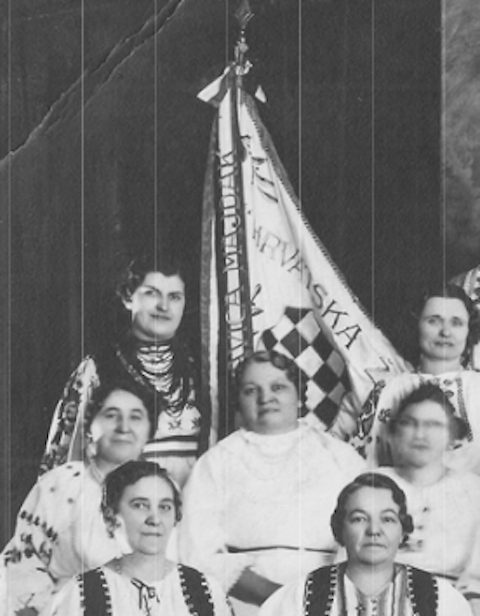Croatian Woman - Hrvatska žena
Darko Žubrinić, 2021.
A History of “Croatian Woman Branch # 1”, Chicago 1929 - 2019
Its Origin in the Homeland
Fr. Jozo Grbeš ofm, Chicago, 2019
"Croatian Woman" was founded in 1921, in Zagreb, with a simple mission to help Croatians who are in need and less fortunate. Its roots are directly tied to a movement that began in the Middle Ages but strengthened in the 19th Century, a movement toZard goodwill and Christian charity. Croatia, much like the rest of the Western World, had a multitude of brotherhoods, fraternities, and Roman Catholic organizations focused on philanthropy and altruism spread throughout the country. After the First World War and the creation of Yugoslavia many of the e[isting and newly founded organizations began to take on Croatian nation oriented agendas in a direct response to the installment of the pro-Serbian government and its attempt to erase the national identity of the Croatian people. Similarly, women involved in Stjepan Radic's political party founded "Croatian Heart" with the same goals in mind : Helping Croatians who were less fortunate while also preserving Croatian Catholic culture. In fact, "Croatian Heart" was the predecessor to the organization "Croatian Woman," which was founded by Maria Kumicic. The first president to be chosen was Zora pl. Trnski, and her vice presidents were Ivka barunica Ozegovic and Maria Kumicic. Being the wives of famous writers and political figures in Croatia, these women's distinguished last names already displayed the legitimacy of the organization and its ability to influence the community. Another display of the organization s legitimacy was its instant proliferation throughout the country : Petrinja (July 1921), Osijek (July 1921), Pozega (July 1921), Karlovac (September 1921), followed in 1922 by Jastrebarsko, Sisak, Daruvar, Gospic, Vukovar, and many other cities.
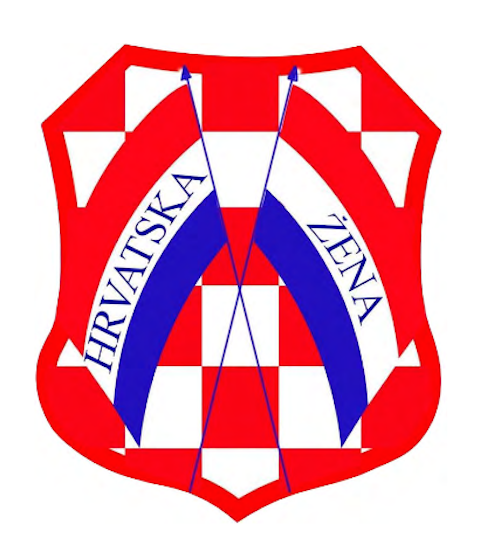
From the start "Croatian Woman," as an organization, was strongly built with a foundation based on clearly set goals in the cultural and humanitarian fields. Their goodwill was deeply imbedded, far-reaching, and felt by many throughout the world wherever Croatians live and people are in need. Their work is best e[emplified and stated in the beginning of the organization's bylaws, which were written by Slava Furst and Julka Patriarch, and which were chartered on May 21, 1921. The bylaws state : "The goal of the organization is to cultivate a social standard among Croatian women, which is conducive to the promotion of social, public, economic, moral and humanitarian health in both national and feminist fields." In order to achieve this, the women divided the goals into separate categories and designated four separate branches cultural, feminist, humanitarian, and social. Josipa Glembay Zrote this song to illustrate their goals in Osijek in 1922.
Live
work and suffer for your country
For Croatian unity is our only hope
The day is near when we will rejoice
Sing proudly in one voice:
“Condemn evil, cherish freedom —
This is the motto of Croatian women.”
For Croatian unity is our only hope
The day is near when we will rejoice
Sing proudly in one voice:
“Condemn evil, cherish freedom —
This is the motto of Croatian women.”
Their unconditional love for their people led them into many fields Zhich brought them into conflict with the authorities. In the early 1920s, during the Serbian monarchy, the organi-zation was banned because of “nationalistic and separatist activities.” Because of their participation in the celebration of the famous Croatian activists Dr. Ante Starcevic and Stjepan Radic, where over one thousand people gathered, the state prohibited the existence of “Croatian Woman” on June 12, 1922. In nearly the same week “Croatian Woman” in the city of Karlovac suffered the same fate. The prohibitions, however, were short‑lived. Even though the organization was punished and prohibited because of their love for their people and their country, they continued their work with a strong determination. Despite all of their hard work, the N.D.H. shut down all existing offices of “Croatian Woman” on May 5, 1943. Twenty two years of humanitarian, cultural, and patriotic work, which began on Patacickinova Street, would cease to exist.
“Croatian Woman” in America
Only a few years after the foundation of “Croatian Woman” in Zagreb, its first branch would open in Chicago. It was the original idea of Agata Durak and her daughter Vilma Strun-jak to start a woman's organization in Chicago's Croatian community. She brought this idea to the attention of Dominican Father Innocent Bojanic at Holy Trinity Croatian Parish in Chicago. With his support, “Croatian Woman, Branch No. 1 – Chicago” was founded on January 27, 1929. Soon the first meeting was called to order, with the following women present: Klara Skvorc (first president), Barbara Balija, Rosalija Kovacevic‑Kirin, Rosalija Sedar‑Vuksanovic, Frances Frkonja, Mary Karacic, Borislava Absac, Ruza Cesar and Magdalena Guldenpfening. From the beginning, the women decided that their main goals would be to help people on both the cultural and humanitarian levels while also displaying Croatian culture to the American people. Immediately, the group was active in creating exhibits throughout the greater Chicago-land area. The state of Illinois recognized the importance of the organization and granted them a legal charter within the year. Almost instantly twenty‑six other branches registered through-out the country.
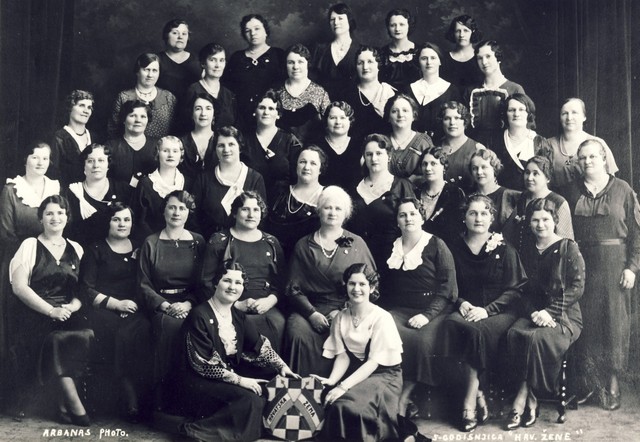
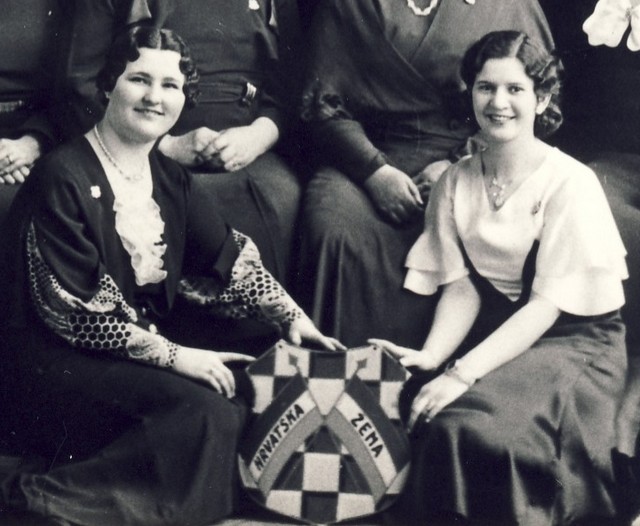
Hrvatska
Žena (Croatian Woman) society, Branch
1 of Chicago founded on January 27, 1929. Another 18 branches
were
founded throughout the United States supporting churches, schools,
charities and cultural programs as well as the
American military during
World War II. Source Vladimir Novak.
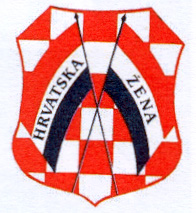
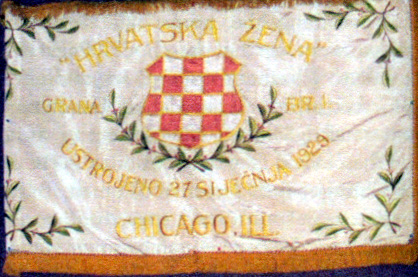
Hrvatska
žena, ustrojena 27. siječnja 1929,
Chicago ILL.
Croatian Woman, founded on January 27, 1929, Chicago ILL., source www.cuvalo.net
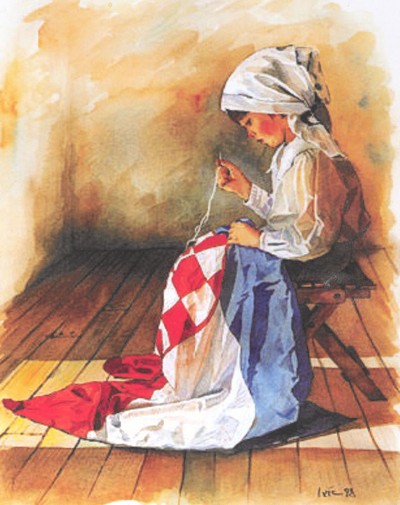
Hrvatska
žena, grana br. 1, Chicago, 1929-2009
Croatian Woman, branch #1, Chicago, 80th Anniversary, source www.cuvalo.net
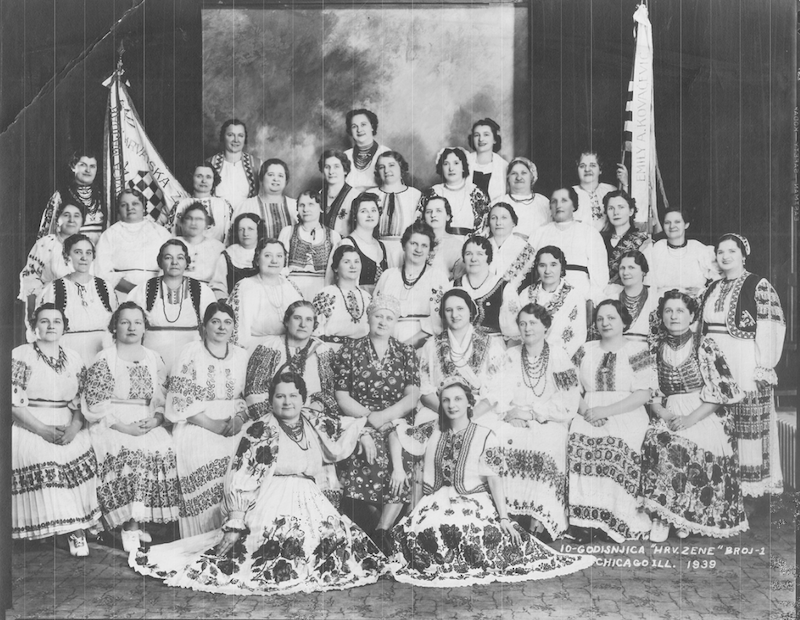
Hrvatska žena, Chicago Illinois
1939, na 10. obljetnicu osnutka
During the Thirties and Forties, when war engulfed the entire world, “Croatian Woman” did all they could to help. In America and abroad, they worked with the Red Cross and local hos-pitals, sending packages to soldiers and medical aid to the wounded. They donated time and money to help their homeland, Croatia, and everyone who was suffering and in pain. After the war, when Croatian refugees were scattered all over Europe and South America, “Croatian Woman” did their best to accommodate their needs.
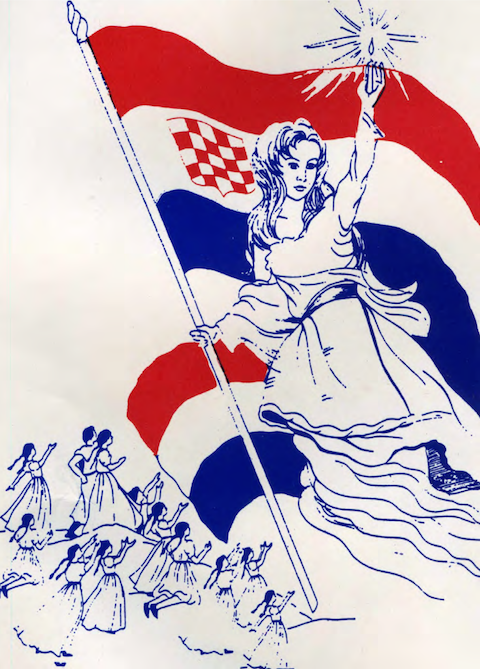
Hrvatska žena, Chicago
After the misfortunes of the war subsided, the organization returned to one of their original goals – promoting Croatian culture in America. In the Midwest, the organization showed great support for Duquesne University, one of the first universities to offer the Croatian language, Croatian folklore and Croatian music as part of their curriculum. Through this, “Croatian Woman” was able to help educate a new generation of Croatians born in America, who needed to combine the knowledge of two cultures. It was their goal to teach their children to be proud both of the United States of America and their Croatian heritage.
Even in the Fifties, Sixties and Seventies, when the homeland was isolated by the Iron Cur-tain of Communism, “Croatian Woman” found ways to send food, medicine and financial aid to the countless victims of flooding and earthquakes. Meanwhile, Croatian Catholic missionar-ies worked hard, combating misery and poverty, to spread the Christian Faith and love. “Croatian Woman” does all it can to support these missionaries and churches.
...
Source [PDF]
Društvo Hrvatska žena
Marija Kumičić osnovala je 1921. godine narodno i prosvjetno društvo Hrvatska žena. Društvo Hrvatska žena osnovano je 21. svibnja 1921. godine, a prva predsjednica društva (1921.-1926.) bila je Zora pl. Trnski (kći književnika Ivana pl. Trnskoga), potpredsjednice bile su Ivka barunica Ožegović i Marija Kumičić, tajnica Slava Fürst a blagajnica Olga Barić. Nakon toga podružnice Hrvatske žene otvarane su u Petrinji (srpanj, 1921.), Osijeku (srpanj, 1921.), Požegi (1921.), Karlovcu (rujan 1921.), Jastrebarskom (1922.), Sisku, Daruvaru, Brodu na Savi, Gospiću, Ogulinu, Vukovaru i drugim hrvatskim gradovima. Društvo je izdavalo i časopis za ženski svijet Naša žena (1935.-1938.) koji je uređivala članica društva dr. Zdenka Smrekar. U Bosni i Hercegovini među hrvatskim življem također osnivane su podružnice društva Hrvatska žena (Tuzla, Derventa, Doboj i inima) a Jagoda Truhelka osnovala je Hrvatsku ženu 1922. godine u Sarajevu. Nekoliko godina nakon toga, 27. siječnja 1929. godine, utemeljeno je prvo društvo Hrvatska žena u Sjedinjenim Američkim Državama, Društvo "Hrvatska žena, Grana br. 1 – Chicago".
Zauzimanjem Marije Kumičić postavljen je kip svećenika Frane Bulića na Marulićevom trgu u Zagrebu, 1935. godine. Društvo Hrvatska žena podiglo je i spomenike te postavilo spomen ploče zaslužnim hrvatskim velikanima kao što su: spomenik Prosinačkim žrtvama (30. listopada 1932. godine na Mirogoju), spomenik Dragutinu Domjaniću (23. svibnja 1936. godine na Tuškancu), spomenik Eugenu Kumičiću (17. listopada 1937. godine ispred zgrade srednjih škola na tadašnjem Wilsonovom, danas Rooseveltovom trgu), a svojim prilozima pomoglo je u podizanju spomenika kralju Tomislavu, Antunu Mihanoviću, Stjepanu Radiću i inima.
Tijekom svoje djelatnosti Marija Kumičić bila je praćena od starojugoslavenske policije a pisma su joj bila zaustavljana i zadržavana.
Društvo Hrvatska žena u svim gradovima je zbog svoga izrazitoga domoljublja bilo kažnjavano i zabranjivano a konačni slom i završetak rada bio je u vrijeme Nezavisne Države Hrvatske. Po Zakonskoj odredbi o imovini raspuštenih i preustrojenih društava (N.N., 5. svibnja 1943. godine) društvu Hrvatska žena bile su oduzete prostorije u Zagrebu, u Patačićkinoj ulici br. 1a, i nakon toga Odbor matice društva odlučio se je na likvidaciju (ukinuće društva).
Izvor Marija Kumičić (Wikipedija)
Literatura
